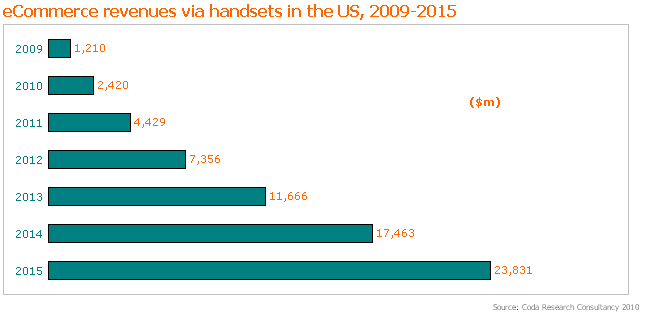We live in a mobile world- and that doesn’t appear to be changing any time soon. Even in this mobile world, not every business sees the benefit in having their own app. They have a range of reaons from their business is too small, large, old, new, isn’t targeting mobile users, likes to be unreachable, isn’t in the right sector for an app etc etc. Here is a graph from Mobile Marketing and Technology showing the current and projected growth of M-commerce:
 I’ll compare three very different businesses and show how each of them, no matter how different, can find benefit in having an app. These apps range from personal convenience (read: customer satisfaction), marketing and online booking forms.
I’ll compare three very different businesses and show how each of them, no matter how different, can find benefit in having an app. These apps range from personal convenience (read: customer satisfaction), marketing and online booking forms.
GoldStar Heat Pumps
Goldstar heat pumps is a heat pumps business that sells and installs heat pumps in Hamilton. I personally believe the best app for them would be one that focuses on personal convenience. As portrayed in the smart home, most people would enjoy the conveience of being able to change their heat pumps settings without leaving the couch. Or to turn on their heat pump before they get home.
A similar app has already being implemented been implemented successfully. Many new heat pumps have Wi-Fi connectivity so users can change their heat pump settings wirelessly. But Goldstar could create a personalisable app and incorporate branding into it.
Why this benefits the business: This provides a major point of difference. It also shows customers they have an understanding of their needs. As mentioned before, similar apps have already been successful and so this provides a great opportunity.
Ibis Tainui Hamilton
Ibis Tainui is a hotel based in Hamilton. I believe the best app for this business would be based on online booking forms. While the business could benefit from a marketing app, most customers wouldn’t download a company app just for promotions. Rather loyal customers who frequently stay at Ibis Tanui might prefer to book from an app.
Why this benefits the business: This idea isn’t revolutionary but it still has high potential. Not only does it increase bookings but it also fosters brand loyalty. Customers might be flipping through their phone, see the app they downloaded to book a Ibis Tainui room, and decide to book another trip soon.
Chubb Security
Chubb Security is a leader in home security and commercial security. Chubb could branch off into two directions with their app – either consumer oriented or business oriented.
Firstly if Chubb wanted a consumer oriented app they could give intruder alert notifications. This would be in the form of an app that notifies users or breached security whether from the home security system or electronic home safes. This would undoubtedly be more complicated to implement for their locks though!
Secondly Chubb could take a business oriented approach by providing contact information. This fairly static app would be better for advertising services such as locksmiths in Auckland or safes.
Why this benefits the business: The consumer oriented approach is clearly a win-win situation. Consumers are safe and can attribute this feeling of safety to the business. The business oriented approach is great for targeting customers who know they need to get their locks fixed but don’t have the time to sit and sift through search pages.



